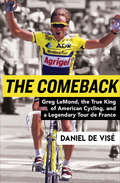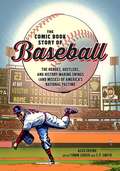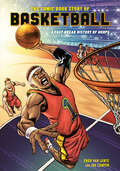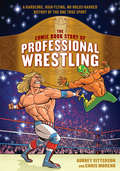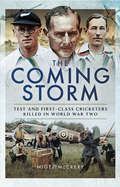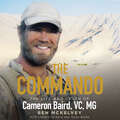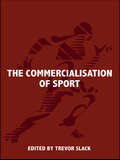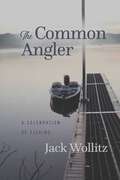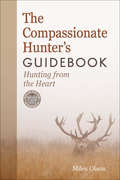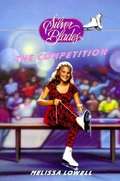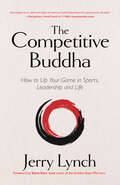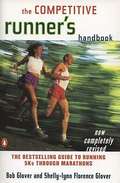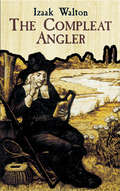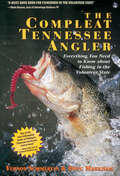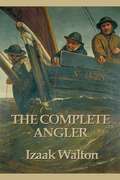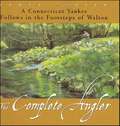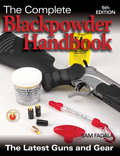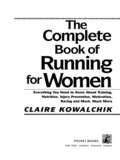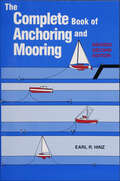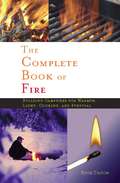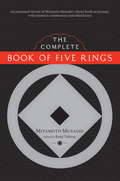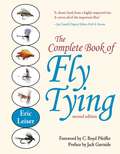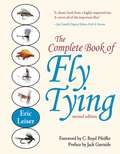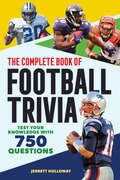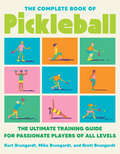- Table View
- List View
The Comeback: Greg LeMond, the True King of American Cycling, and a Legendary Tour de France
by Daniel de Visé&“Greg LeMond was Lance Armstrong before Lance Armstrong . . . the story of a true hero . . . This is a must read if you believe in miracles.&”―John Feinstein, New York Timesbestselling author In July 1986, Greg LeMond stunned the sporting world by becoming the first American to win the Tour de France, the world&’s pre-eminent bicycle race, defeating French cycling legend Bernard Hinault. Nine months later, LeMond lay in a hospital bed, his life in peril after a hunting accident, his career as a bicycle racer seemingly over. And yet, barely two years after this crisis, LeMond mounted a comeback almost without parallel in professional sports. In summer 1989, he again won the Tour—arguably the world&’s most grueling athletic contest—by the almost impossibly narrow margin of 8 seconds over another French legend, Laurent Fignon. It remains the closest Tour de France in history. &“[A] blend of chaos, kindness and cruelty typifies the scenes that journalist de Visé brings to life in this sympathetic-verging-on-reverential retelling of LeMond&’s trailblazing career (first American to enter the tour, first to win it) . . . As an author in quest of his protagonist&’s motivation, [de Visé] subjects it to extreme torque.&”—The Washington Post &“A great book . . . Well written and thoroughly researched . . . Engrossing and hard to put down. If you&’re a Greg LeMond fan, The Comeback is a must read because it&’s a detailed accounting of his career and―more importantly―his life and person off the bike. It&’s also an important reminder that American cycling did not begin and end with Lance Armstrong.&”—PEZ
The Comic Book Story of Baseball: The Heroes, Hustlers, and History-Making Swings (and Misses) of America's National Pastime (Comic Book Story of)
by Alex IrvineA graphic novel-style history of baseball, providing an illustrated look at the major games, players, and rule changes that shaped the sport.This graphic novel steps up to the plate and covers all the bases in illustrating the origin of America's national pastime, presenting a complete look at the beginnings (both real and legendary), developments, triumphs, and tragedies of baseball. It also breaks down the cultural impact and significance of the sport both in America and overseas (including Japan, Cuba, and the Dominican Republic), from the early days of America to the flying W outside Wrigley Field in 2016.Featuring members of Baseball's Hall of Fame and modern day stand-outs—including Cy Young, Babe Ruth, Jackie Robinson, Hank Aaron, the 1930s New York Yankees, the 2004 Boston Red Sox, the 2016 Chicago Cubs, and more—The Comic Book Story of Baseball spotlights the players, teams, games, and moments that built the sport's legacy and ensured its popularity.
The Comic Book Story of Basketball: A Fast-Break History of Hoops (Comic Book Story of)
by Fred Van Lente Joe CooperA fast-break history of basketball--from its humble beginnings to its all-time great players--featuring engaging true tales from the court and vivid, dynamic illustrations.Whether it's millionaire pros facing off in an indoor arena full of screaming fans or a lone kid shooting hoops on an outdoor court, basketball is one of the most popular and widely played sports in the world. The Comic Book Story of Basketball gives you courtside seats to the history of hoops. It chronicles the sport from its beginnings in a YMCA in Massachusetts to its current status as a beloved international game for men and women of all ages. Learn the true stories behind the college game, the street game, the women's game, and the international game, with legendary players and coaches like Dr. J, Michael Jordan, LeBron James, and Steph Curry profiled throughout.
The Comic Book Story of Professional Wrestling: A Hardcore, High-Flying, No-Holds-Barred History of the One True Sport (Comic Book Story of)
by Aubrey Sitterson Chris MorenoFrom the host of the critically acclaimed pro wrestling podcast Straight Shoot, this graphic novel history of wrestling features the key grapplers, matches, and promotions that shaped this beloved sport and form of entertainment.As a pop culture phenomenon, professional wrestling--with its heroic babyfaces and villainous heels performing suplexes and powerbombs in pursuit of championship gold--has conquered audiences in the United States and around the world. Now, writer/podcaster Aubrey Sitterson and illustrator Chris Moreno form a graphic novel tag team to present wrestling's complete illustrated history. Featuring legendary wrestlers like Bruno Sammartino, Hulk Hogan, and The Rock, and modern-day favorites like John Cena, Kenny Omega, and Sasha Banks, the book covers wrestling's progress from the carnival days of the Gold Dust Trio to the dominance of the WWF/WWE to today's diverse independent wrestling scene, and it spotlights wrestling's reach into Mexico/Puerto Rico (lucha libre), the U.K. (all-in), and Japan (puroresu).
The Coming Storm: Test and First-Class Cricketers Killed in World War Two
by Nigel McCreryThe outbreak of the Second World War came towards the closing stages of the 1939 cricket season. Hitler permitted us almost to complete an exceptionally interesting season, Sir Home Gordon, wrote in the Cricketer magazine, When shall we see the stumps pitched again?As the West Indies touring team canceled their last five matches and sailed home before the U-boat threat developed, the treasures at Lords, including the Ashes, were sent to a secret location for safekeeping. The Marylebone Cricket Club cancelled its tour to India - England played under the MCC banner then.During the ensuing conflict twelve test cricketers (five English, two South Africans, one Australian and one New Zealander) perished together with 130 first class players. In this superbly researched sequel to Final Wicket, covering cricketing fatalities during The Great War, this book reveals each mans career details, including cricketing statistics, and the circumstances of death. There is also a brief history of the game during the War. Arguably the period between the two world wars was the golden age of cricket, and this book honors those who made it so only to die serving their countries in a different way.
The Commando: The life and death of Cameron Baird, VC, MG
by Ben MckelveyOn 22 June 2013, Corporal Cameron Baird was a 2nd Commando Regiment Special Forces soldier when he led his platoon into a known Taliban stronghold to back-up another Australian unit under heavy fire. In the pronged firefight, Cameron was mortally wounded. In 2014, Cameron's bravery and courage under fire saw him posthumously awarded the 100th Victoria Cross, our highest award possible for bravery in the presence of the enemy. Cameron Baird died how he lived - at the front, giving it his all, without any indecision. He will forever be remembered by his mates and the soldiers he served with in the 2nd Commando Regiment. THE COMMANDO reveals Cameron's life, from young boy and aspiring AFL player, who only missed out on being drafted because of injury, to exemplary soldier and leader. Cameron's story and that of 4RAR and 2nd Commando personifies the courage and character of the men and women who go to war and will show us the good man we have lost.
The Commercialisation of Sport (Sport in the Global Society)
by Trevor SlackWhat does commercialisation mean for the future of sport?Modern sports links to commerce are highly visible. Stadiums and arenas bear the names of businesses, while sponsors' logos appear on athletes' clothing and equipment, on the facilities in which they play, and in the titles of the events in which they compete. Media companies pay vast sums for the rights to broadcast sports events, and advertisers pay a premium to promote products during the screening of these events. Cities invest, at the expense of other social projects, in the staging of major sports events and to attract professional teams to their areas. Star athletes are transferred for multi-million fees and professional sport franchises are sold for sums higher than the gross domestic products of some countries. Even recreational athletes are subject to a constant barrage of commercial pressures to improve their game.Sport's links to commerce have intensified over the past 30 years but have been subjected to little academic analysis. This book represents an attempt to fill that significant gap in the literature by examining five different aspects of the commercialisation of sport: · The sports industry · The public sector · The commercialisation of 'amateur' sport · Sport and television · Sports sponsorship There has been a rapid and widespread commercialisation of sport and it is vital that we now raise critical questions and analyse the changes that have taken place.
The Common Angler: A Celebration of Fishing
by Jack WollitzCollects over thirty fun, perceptive, and insightful essays by longtime journalist/fisherman Jack Wollitz, who writes with uncommon eloquence as he celebrates the primordial connection of people to fish and fishing. "If you want a book that gives you a pure and down to earth take on why we fish, you should give this one a read. Jack Wollitz did an awesome job telling us exactly why through his personal journey." —Joe Thomas, TV Host of Reel in the Outdoors The Common Angler taps into the passion that simmers in the souls of anglers and celebrates the primordial connection of people to fish and fishing. Author Jack Wollitz set out to explain the &“why&” behind the fact that so many people are passionate about fishing and along the way discovered a book&’s worth of experiences and stories. Early chapters cover the foundation of Jack&’s own passion for fishing and explore the connection we have with water and the creatures that depend on it for life. The Common Angler explores fishing friendships, relationships, and observations; extraordinary experiences; and the value of personal time on the water. Also included is a whimsical piece that personifies two common waterside fixtures. A key chapter draws parallels between the legendary River Lea in Izaak Walton&’s The Compleat Angler, written in the mid-seventeenth century, and Northeast Ohio&’s Mahoning River and the mighty Ohio River. The Common Angler also provides an insider&’s perspective about what makes certain people great anglers, featuring two Northeast Ohio men known for their fishing accomplishments, as well as Ernest Hemingway, baseball stars Ted Williams and Wade Boggs, and Rick Clunn, considered the greatest bass angler of all time. The book advances with chapters that explore the development and popularity of competitive fishing, the therapeutic value of fishing when times are difficult, and even the pain and suffering dedicated anglers sometimes endure. The Common Angler concludes with an examination of the obligations anglers shoulder and how we can grow with our passion. &“Next time you go to the water, open your eyes wider than ever before. Listen like your ears are amplifiers. Breathe with a purpose, deep and slow, so every molecule of nature checks in with your brain. Feel the sun. Touch the water. Ask yourself why you are there and what you intend to accomplish. Do this and you will be fishing. Do it every time and you will open a new chapter in your life as an angler.&”
The Compassionate Hunter's Guidebook: Hunting from the Heart (Mother Earth News Books for Wiser Living)
by Miles Olson&“This book reminds us that hunting provides sustenance for both body and soul, and that mindful eating requires both respect and gratitude.&”—Tovar Cerulli, author of The Mindful Carnivore Wild meat, hunted in a responsible way, is one of the most healthful, sustainable foods possible. Depending on how it is done, hunting can be as local, intimate and humane as it gets. And aside from this, it demands the hunter enter a world of awareness, wildness, life and death that as a culture we have lost connection to. The Compassionate Hunter&’s Guidebook is for those who come to the act of hunting with pure intentions, motivated by a desire for healthy food that comes directly from the land where they live. This practical manual suggests that hunting is not a &“sport&” and the animals whose lives are taken are not &“game.&” It combines a deep, philosophical exploration of the ethics of killing with detailed instructions on every step of the process including: Understanding your preyTools, techniques and preparationThe act of the huntFrom forest to table—processing, preserving and preparing your kill. A unique and comprehensive, fully-illustrated guide to the complexity, ethics and spirit of the hunt, The Compassionate Hunter is a must-read for beginning and experienced hunters alike. It will appeal to anyone who wishes to delve more deeply into the complex, humbling and ultimately profound reality of our relationship with the food that nourishes us. &“Arguably the food that most closely approximates our nutritional needs, wild game assumes a sacred and satiating beauty in The Compassionate Hunter.&”—Joel Salatin, farmer and author of Pastured Poultry Profits
The Competition (Silver Blades, #3)
by Melissa LowellTori and her friends can't wait to go to the regional competition at New York. But she is in for some surprises once she gets there. Why is her mother hiding her mail? Who is the stranger watching her practice? Will Tori ever be able to compete?
The Competitive Buddha: How to Up Your Game in Sports, Leadership and Life
by Jerry LynchBuddha Can Improve Your Sports Performance and Life“No other person has had more influence on my thirty-six years of coaching than Jerry Lynch.”—Missy Foote, Head women's lacrosse coach, Middlebury College#1 New Release in Coaching Hockey, Tennis, and Eastern PhilosophyThe Competitive Buddha is about mastery, leadership, spirituality, and the Kobe Bryant Mamba Mentality. Discover how people from all parts of the world have brought together the Buddha and athletics for greater fun, enjoyment, and pleasure during their performances.Connect spirituality to sports. Learn what you need to keep, what you need to discard, and what you need to add to your mental, emotional, and spiritual skill set as an athlete, coach, leader, parent, CEO, or any other performer in life. Understand how Buddhism can help you to be better prepared for sports and life, and how sports and life can teach you about Buddhism.On the court, field, and beyond. Dr. Lynch is an avid runner and biker and he has coached athletes at the high school and AAU level. He earned his doctorate in psychology at Penn State University and has done extensive post-doctoral work in the area of philosophy, Taoist and Buddhist thought, comparative religions, leadership development, and performance enhancement. Dr. Jerry Lynch demonstrates how certain timeless core Buddha values inspire you to embrace and navigate unchartered waters and understand the Buddha-mind and the Kobe Bryant Mamba Mentality.Become a master coach of your own life. When it comes to leadership and coaching, The Competitive Buddha teaches how the best coaches today use the ancient methods for our modern times. Learn specific strategies and techniques for implementing this special way to guide and lead.The Competitive Buddha teaches:Leadership SkillsHow to use Buddhism as an approach to competitionHow to master athletics and lifeReaders who enjoyed Win the Day, Mamba Mentality, or Relentless Optimism will love The Competitive Buddha.
The Competitive Runner's Handbook
by Shelly-Lynn Florence Glover Bob GloverFor both runners entering that first neighborhood race and elite marathoners, trainers Bob and Shelly-lynn Florence Glover's completely revised guide is the book on training to compete. A book that's already sold close to 200,000 copies, The Competitive Runner's Handbook will now offer all the latest information needed to design basic training programs; special workouts to increase strength, endurance, and power; schedules and worksheets to develop individual goals; and specifics on preparing for all kinds of races?with an emphasis on the 10K and the marathon. Informed by their over thirty years of coaching experience, the Glovers give winning tips on alternative training, footwear and diet, and common injuries and illnesses, as well as sensible advice on balancing running with work and home life.
The Compleat Angler: Or, Contemplative Man's Recreation
by Izaak WaltonFirst published in 1653, this literary and nature classic was created by a Londoner with a passion for rustic life. As satisfying a primer on fishing as any angler could wish, it celebrates the art and spirit of fishing with verse, song and folklore, moral reflections, and timeless wisdom. Cast in the form of a dialogue between the veteran angler Piscator and his pupil Viator, it both informs and delights with an ingenious exploration of fishing's subtle intricacies and the pleasures of the natural world.
The Compleat Tennessee Angler: Everything You Need to Know about Fishing in the Volunteer State
by Vernon Summerlin Doug MarkhamExperienced fishermen from across Tennessee share their angling secrets in this comprehensive lake-by-lake guide. Vernon Summerlin and Doug Markham have consulted with more than 60 of Tennessee's best fishermen and professional guides with more than 1,000 years of angling knowledge between them to reveal fishing secrets about all major Tennessee lakes. In The Compleat Tennessee Angler, you will discover: Which fish are rated &“best&” on each lake How to locate your favorite fish When the fish will bite and when they won't Which baits, rigs, and techniques work best in every season How to contact professional fishing guides in each region Where to get shoreline boundary and topographic maps &“At a Glance&” boxes provide information on the available species of game fish, geography, lake-bottom terrain, location, size, and winter and summer pools for each lake. An easy-to-read rating system tells in an instant if your favorite fish swims in a particular lake and how good the fishing for that species is. Includes an easy-to-understand glossary.
The Complete Angler
by Izaak WaltonThe Compleat Angler was first published in 1653, but Walton continued to add to it for a quarter of a century. It is a celebration of the art and spirit of fishing in prose and verse; 6 verses were quoted from John Dennys's 1613 work Secrets of Angling.
The Complete Angler: A Connecticut Yankee Follows in the Footsteps of Walton
by James ProsekJames Prosek has been called "the Audubon of the fishing world" by the New York Times. A passionate fisherman and talented artist from a young age, he published two illustrated books on fish and fishing while still an undergraduate at Yale. After winning a traveling fellowship to follow in the footsteps of Izaak Walton, The Compleat Angler became his obsession. He was fascinated by Walton, a humble man who won the friendship of kings, and he was intrigued by the book's philosophies concerning the timelessness and immortality that could be achieved by fishing. Although Walton was sixty when The Compleat Angler was published and Prosek only twenty when he set off to visit England, they each had traits in common: a love of fishing and an extraordinary ability to make friends.This is the story of a young man's pilgrimage through England, fishing the waters that are now privately held. Along with wonderful stories about good times, great fishing, and fine eating, this trip becomes an exploration of Waltonian ideals: how to live with humor, wisdom, contentment, and simplicity.The original watercolors complementing the text are wonderful. Like Walton's book, The Complete Angler is not about fishing but about life. Or rather, it is about fishing—but fishing is life.
The Complete Blackpowder Handbook
by Sam FadalaThe Clear Choice for Blackpowder Enthusiasts! The Complete Blackpowder Handbook is the place for the latest information on blackpowder traditional and in-line guns, muzzleloaders and cartridge guns, as well as ballistics and techniques. Expert Sam Fadala's personal experiences, along with the results of his scientific testing method, present a very clear, user-friendly study of everything blackpowder. Topics he covers, include: Shooting Cleaning Repairing Tune-ups Ballistics Do-It-Yourself In addition to the desirable technical information, Fadala rounds out this blackpowder bible with bits of interesting blackpowder folklore and history. With The Complete Blackpowder Handbook, you won't be disappointed.
The Complete Book Of Running For Women
by Claire KowalchikMore women than ever are discovering the unique benefits of running -- for stress relief, weight management, endurance, and self-esteem. Women's bodies are not the same as men's, and though we can train just as hard and with the same passion for excellence, we have certain special concerns. Finally, there is a comprehensive guide exclusively for women who experience the pure joy of running, or want to. It's the simplest, fastest, most accessible way to fitness and good health known to woman. You don't need a partner, equipment, or even much time. Now, Claire Kowalchik, former managing editor of Runner's World magazine, answers every question about the overwhelmingly popular activity that builds endurance, melts fat, and even prevents illness. In this total running book for women, you'll learn: How to get started and stay motivated What to eat for optimal nutrition How to run during pregnancy and after menopause Why running is the most effective form of exercise How to prevent and treat injury What to wear -- from sports bras to running shoes How to prepare for everything from a 5K to a marathon Authoritative and friendly, The Complete Book of Running for Women is a sourcebook for both beginners and long-time runners. Along with wisdom drawn from the author's personal experience, you'll find advice from the experts: coaches, exercise physiologists, nutritionists, doctors, and other women runners. Including question-and-answer sections and a complete list of resources, The Complete Book of Running for Women tells you everything you need to know to be off and running toward better health and richer living.
The Complete Book of Anchoring and Mooring
by Earl R. HinzThe Complete Book of Anchoring and Mooring addresses anchoring systems, techniques, and permanent moorings for boats from twelve feet to eighty feet in length. It covers monohulls, multihulls, light displacement sailboats, cruisers, sportfishers, passagemakers, and workboats. In short, it is for all recreational and working boats in this size range. Since the last printing of this book a number of revolutionary anchor concepts have appeared on the boating scene. These unique designs have shown exceptional performance when compared by a renowned testing agency with their contemporaries. Changes made to this revised second edition ensure its continued role as the state-of-the-art source book for the boating world.
The Complete Book of Fire
by Buck TiltonWith a focus on safety and the integrity of the outdoors, The Complete Book of Fire: Building Campfires for Cooking, Warmth, Light, and Survival initiates the novice as well as informs the experienced. Integrating the history, ecology, and science of fire with practical aspects of campfires such as cooking and warmth, author Buck Tilton has created the ultimate guide to properly building, enjoying, and extinguishing campfires.
The Complete Book of Five Rings
by Miyamoto Musashi Kenji TokitsuThe Complete Book of Five Rings is an authoritative version of Musashi's classic The Book of Five Rings, translated and annotated by a modern martial arts master, Kenji Tokitsu. Tokitsu has spent most of his life researching the legendary samurai swordsman and his works, and in this book he illuminates this seminal text, along with several other works by Musashi. These include "The Mirror of the Way of Strategy," which Musashi wrote when he was in his twenties; "Thirty-five Instructions on Strategy," and "Forty-two Instructions on Strategy," which were precursors to The Book of Five Rings; and "The Way to Be Followed Alone," which Musashi wrote just days before his death. Read together, these five texts give readers an unusually detailed, nuanced view of Musashi's ideas on swordsmanship, strategy, and self-cultivation. Tokitsu puts all these writings into historical and philosophical context and makes them accessible and relevant to today's readers and martial arts students. Tokitsu understands Musashi's writings--and Musashi as a martial artist--unusually well and is able to provide a rare insight into the man and his historical contribution.
The Complete Book of Fly Tying
by Eric Leiser Jack Gartside C. Boyd PfeifferHere is a book for fly tiers, beginners and experts alike, that provides foolproof directions for tying all types of flies. Unlike specialized books that describe particular types or styles of flies, this book covers them all-both freshwater and saltwater flies. Dry flies for trout, streamers for tarpon, hair bugs for bass: you will find them here. Eric Leiser teaches the basic methods for tying standard dries, hair dries, parachute dries, hackleless flies, wets, nymphs, streamers, Jassids and other terrestrials, and more. Whether you're a seasoned tier looking for specific advice, or you're brand new to the craft and just want the fundamentals, this book is a complete education.
The Complete Book of Fly Tying
by Eric Leiser Jack Gartside C. Boyd PfeifferHere at last is a book for fly tiers, beginners and experts alike, that provides foolproof directions for tying all types of flies. In this book even the beginner knows where he is during every step in the process, from the moment he ties in the waxed thread until he ties off the fly with the whip finish knot. But unlike the specialized books on fly tying that describe particular types or styles of flies, this book covers them all -- all types of both freshwater and saltwater flies. Whether you are talking about dry flies for trout, streamers for tarpon, or hair bugs for bass, you will find them here. Eric Leiser teaches the basic methods for tying all basic flies. Standard dries? Yes. Hair dries? Yes. Parachute dries? Yes. Hackleless flies? Again yes. Wets, nymphs, streamers, Jassids and other terrestrials, bucktails and Muddlers, Spuddlers and Matukas? Yes, everything! This book provides all the basics for the different types and styles of flies, and patterns are given for the most important flies in each category. The drawings are the work of another master fly tier, Dave Whitlock, who knows the processes himself and supplements Leiser's detailed instructions with step-by-step illustrations. In addition, there are clear and useful photographs by Gus Nevros. In sum, this is truly The Complete Book of Fly Tying. It will clarify the mysteries for the beginner; it will reveal tricks of the trade for the expert who seeks to improve his method or who wants to tie types of flies he has not attempted before. It also covers, of course, the necessary tools and is filled throughout with immensely helpful discussion of materials, and their special uses and characteristic behavior during the process of tying. And there is specific advice on how to master difficult or obstinate materials such as deer hair, which often baffles beginning tiers of the hair-bodied fly. Throughout, Eric Leiser not only describes each step in detail, but shows how to avoid some all-too-common mistakes. This book is a complete education -- and one that will leave you well prepared to tie any kind of fly for any fish taken on the fly rod.
The Complete Book of Football Trivia: Test Your Knowledge with 750 Questions
by Jerrett HollowayAre you a real football fan? Prove it!Put your football knowledge to the test! With this NFL trivia book in hand, you'll be able to quiz yourself and your friends on the league's all-time great players and franchise dynasties, as well as the coaches, larger-than-life owners, and others who helped make football a staple of American culture.750 questions—Discover hours of sports trivia fun with hundreds of questions about everything from early football history to famous games, the NFL draft, the Hall of Fame, and more.For all football lovers—This football trivia book is for football fans of all ages. Give it as a gift, pass it around at a party, bring it to game night, or quiz yourself!Go beyond the game—Learn even more with sections that explore the evolution of the Super Bowl halftime show, the story of the USFL, famous off-the-field antics, and more.Show off your sports trivia skills with this big book of football trivia.
The Complete Book of Pickleball: The Ultimate Training Guide for Passionate Players of All Levels
by Kurt Brungardt Brett Brungardt Mike BrungardtA holistic workout program that shares ways to improve the fitness benefits of this wildly popular sport while remaining injury-free.Build Your Best Pickleball Body and Play Fast, Strong, and Injury-FreeEasy to learn and fun to play, pickleball is also a surprisingly athletic sport. In this user-friendly book, fitness superstars, the Brungardt brothers, focus their expertise on the needs of pickleball players of all levels, applying the same innovative training methods they&’ve used with NBA MVPs, Cy Young Award-winners, and Olympic and tennis champions, to make picklers more athletic and injury-resistant.To safely reach your pickleball potential, health and fitness professionals agree that the sport should not be your only form of exercise. To fill this critical gap, the Brungardts have created PB-150, a comprehensive program that delivers all the components of an elite pro training center experience—with the fun and flexibility of the pickleball spirit.The Complete Book of Pickleball brings together a dream team of experts in the fields of strength and conditioning, sports movement, sports vision, physical therapy, sports psychology, athletic training, performance nutrition, and sports medicine. Along with the Brungardts, these experts will coach you through an interactive, easy-to-follow, holistic workout that includes:Prehab exercises to help you avoid injuries and play pain-freeDynamic warm-ups to prep you to play at a high levelStrength Training to increase your power outputDrills to improve balance, coordination, agility, and quicknessSports Vision Training to boost reaction timeMental techniques to enhance your game and create resiliencePerformance nutrition to fuel, recover, and rebuildCombining your passion for the game with the PB-150 training program gives you a portal into all the transformative benefits of exercise, while allowing you to enjoy the game you love, for a lifetime.
